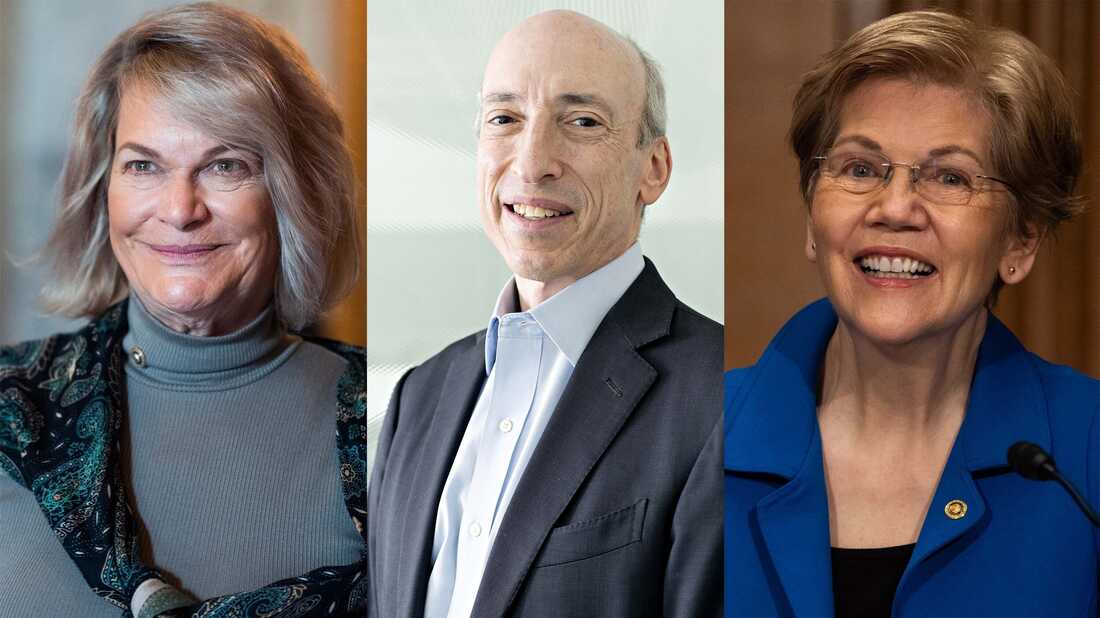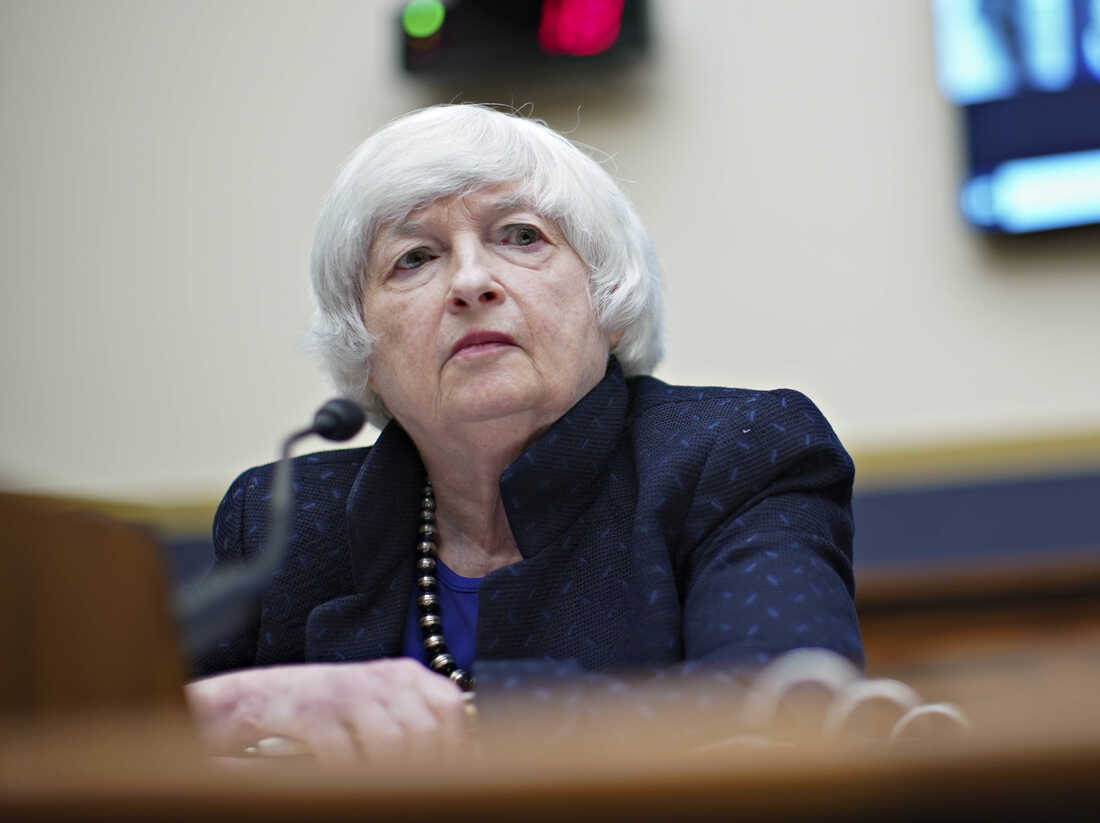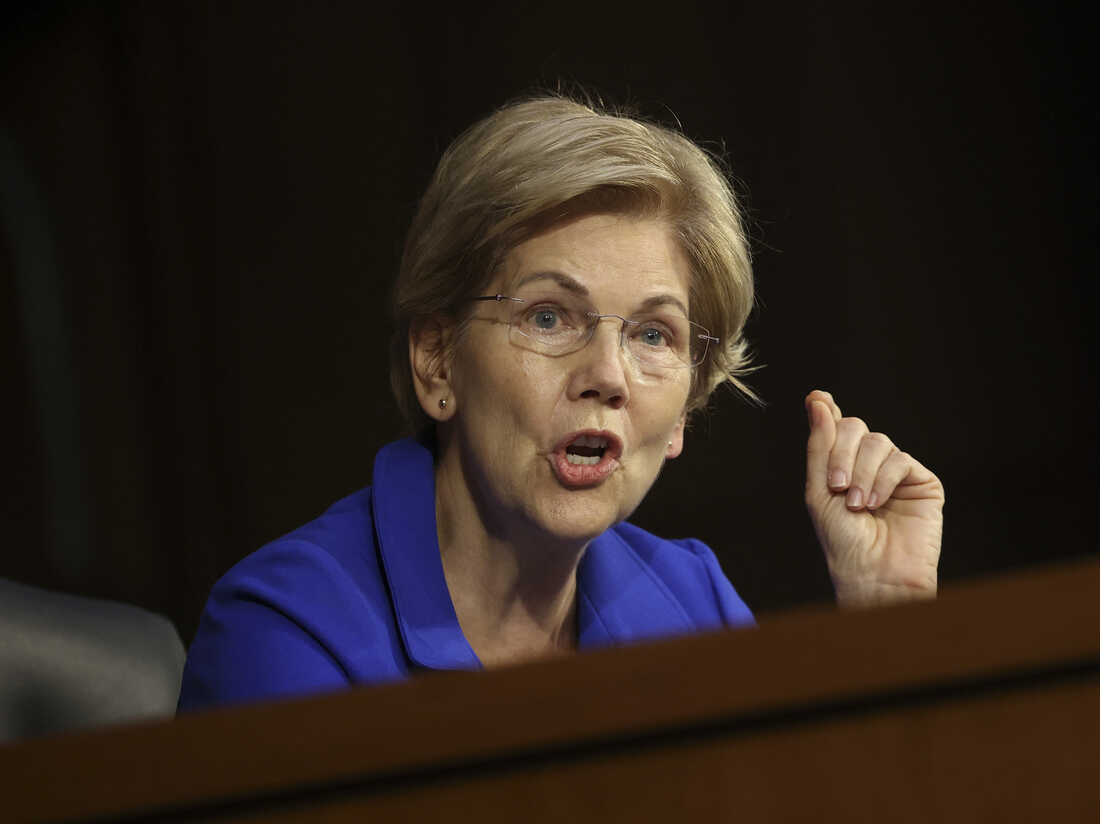
From left to right: Sen. Cynthia Lummis, R-Wyoming; Securities and Exchange Commission Chairman Gary Gensler; and Sen. Elizabeth Warren, D-Mass. All three are likely to play important roles as the country starts to shape regulations for cryptocurrencies such as Bitcoin. Tom Williams/CQ-Roll Call, Inc/Getty Images; Melissa Lyttle/Bloomberg/Getty Images; Graeme Jennings/Pool/Getty Images/Various
Cryptocurrency is at a crossroads.
As its popularity explodes, the Biden administration is laying the groundwork to set rules for an industry that has surged in popularity, but has so far fallen into a regulatory netherworld.
That's sparking what's likely to be a heated debate about which agencies have the authority to regulate cryptocurrencies such as Bitcoin – and what Congress' oversight responsibilities should be in a market that has grown to $2.5 trillion, or slightly less than the size of France's economy.
Currently, the expectations are that supervision will likely be spread across several regulators, including the Securities and Exchange Commission (SEC) and the Commodity Futures Trading Commission (CFTC).
Yet there's a divergence of views of how tough rules should be, from lawmakers who believe the U.S. should embrace what they see as a financial revolution, to watchdogs alarmed about an industry they say is rife with fraud and bad actors.
Here are some of the key players to watch as that debate takes shape.
SEC Chairman Gary Gensler

Securities and Exchange Commission Chairman Gary Gensler speaks during a Senate Banking, Housing, and Urban Affairs Committee hearing on Sept. 14 in Washington, D.C. Gensler is likely to be a vital voice in shaping regulation for cryptocurrencies. Evelyn Hockstein/Pool via AP
Gensler, a veteran regulator who returned to Washington, D.C., to head the SEC, is perhaps the person who will most help determine the rules on cryptocurrencies.
As head of the SEC, he is tasked with protecting investors and ensuring fair and orderly markets.
At the Massachusetts Institute of Technology, he taught a popular course called "Blockchain and Money."
Confirmed by a vote of 53-45, Gensler has said — in speeches and Congressional testimony — that cryptocurrencies and related financial products should be subject to greater regulation.
"Right now, we don't have enough investor protection crypto," Gensler told the Aspen Security Forum in August. "Frankly, at this time, it's more like the Wild West."
Crypto-savvy congressmen on both sides of the aisle say they are glad Gensler speaks their language, but lawmakers who want fewer or less-stringent rules worry Gensler and the SEC will put in place tough new rules.
Whatever he unveils, Gensler has said he would like Congress to be involved.
"We need additional congressional authorities to prevent transactions, products, and platforms from falling between regulatory cracks," he said in August. "We also need more resources to protect investors in this growing and volatile sector."
CFTC Acting Chairman Rostin Behnam

Commodity Futures Trading Commission (CFTC) Acting Chairman Rostin Behnam in a file photo from the agency's website. Behnam is calling for the CFTC to have a major role in supervision of cryptocurrencies. Commodity Futures Trading Commission/Commodity Futures Trading Commission website
Having served as a member of the Commodity Futures Trading Commission since 2017, Rostin Behnam has been nominated to be its next chairman. (He is currently doing the job in an acting capacity.)
There is a turf war among regulators, primarily between the SEC and the CFTC, about which agency should have the main authority to regulate cryptocurrencies.
During his confirmation hearing before the Senate Agriculture Committee in October, Behnam made the case that the C.F.T.C. should have a bigger role in regulation, even as he acknowledged it would "be a departure from our historical role as a derivatives regulator."
"I think it is important to have a primary cop on the beat," he told lawmakers. "And certainly the C.F.T.C. is prepared to do that if this committee so wishes."
Behnam's argument goes to the heart of another basic question that regulators are grappling with: how to define cryptocurrencies. Currently they can be considered both commodities or securities, a confusion that speaks to the current lack of regulatory clarity.
Treasury Secretary Janet Yellen

Treasury Secretary Janet Yellen listens at a House Financial Services Committee hearing on oversight of the Treasury Department and Federal Reserve coronavirus pandemic response on Sept. 30, 2021 in Washington, D.C. Traditionally, Historically, Treasury has overseen the writing and implementation of new regulations across agencies. Al Drago/Pool/Getty Images
Historically, the Treasury Department has overseen the writing and implementation of new regulations across agencies, and when it comes to cryptocurrency, it is likely to play a similar role.
It just released a new report written by a group of regulators on "stablecoins" — a cryptocurrency that's pegged to a traditional asset like the dollar.
In the report, Treasury called on Congress to clearly determine who has authority overr stablecoins. Otherwise, the Financial Stability Oversight Council, which Treasury Secretary Janet Yellen chairs, could implement new regulations, the report argued.
Sen. Elizabeth Warren (D-Mass.)

Sen. Elizabeth Warren, D-Mass., speaks during a Senate Armed Services Committee meeting on Sept. 28. Warren has called for stronger regulation for cryptocurrencies. Kevin Dietsch/POOL/AFP via Getty Images
Count Warren, the progressive senator from Massachusetts as a cryptocurrency skeptic. She has expressed her concerns about investor protection — or the lack thereof.
Although cryptocurrencies are held by millions, they have also been used by bad actors, including to demand ransomware payments in virtual money. Hackers have also stolen funds from crypto exchanges.
Warren will likely help shape regulations as a member of the Senate Banking Committee, and she believes Congress needs to do more to regulate cryptocurrencies.
"Right now, our regulators, and frankly our Congress, is an hour late and a dollar short," she told Bloomberg TV. "We need to catch up with where these cryptocurrencies are going."
Sen. Cynthia Lummis (R-Wyoming)

Sen. Cynthia Lummis, R-Wyoming, (R-WY) questions Treasury Secretary Janet Yellen and Federal Reserve Chairman Jerome Powell during a Senate Banking, Housing and Urban Affairs Committee hearing on Sept. 28 in Washington, D.C. Lummis calls herself a ""HOLDler," or somebody who buys and holds onto cryptocurrencies even when volatile. Kevin Dietsch/POOL/AFP via Getty Images
Then there are the strong cryptocurrency supporters, like Lummis.
Wyoming's junior senator calls herself a "HOLDler," which is crypto-speak for someone who has bought cryptocurrency and continues to hold onto it despite its extreme volatility.
Lummis is one of only a few lawmakers personally invested in cryptocurrency, which means she personally could stand to gain or lose from the regulations shaped by Congress.
After her son-in-law introduced her to crypto, Lummis bough her first Bitcoin in 2013, for $330. Today, it is worth more than $60,000, and she has bought more cryptocurrency in recent months.
Lummis, a member of the Senate Banking Committee, is in favor of "light-touch regulation," she says. "We want the innovators to innovate. We want to create a space where the United States is the leader in opportunity for the creation and use of digital assets."
Sen. Patrick Toomey (R-Pa.)

Sen. Pat Toomey, R-Pa., questioning Yellen and Powell during the Senate Banking, Housing and Urban Affairs Committee hearing on Sept. 28 in Washington, D.C. Toomey believes cryptocurrencies could be "as revolutionary as the internet." Kevin Dietsch/Getty Images
As the ranking member of the Senate Banking Committee, Sen. Patrick Toomey has invested in cryptocurrency — in Bitcoin and Ethereum. Earlier in his career, he was a currency trader.
Toomey has suggested cryptocurrency could be "as revolutionary as the internet."
Toomey, who will retire next year, has called on his colleagues and regulators "to recognize that open, public networks are here to stay," and he has emerged an outspoken voice against excessive oversight and regulation of cryptocurrencies.
Last month, after China effectively banned mining and trading Bitcoin, Toomey argued it was "a big opportunity to the U.S." to become a global leader in cryptocurrencies.
The House lawmakers

Rep. Darren Soto, D-Fla. is pictured in April 2014 when he served as a state senator in Florida. He's co-chair of the Congressional Blockchain Caucus. Phil Sears/AP

Rep. Bill Foster, D-Ill., speaks AT at a House Select Subcommittee on the Coronavirus Crisis hearing on Oct. 2, 2020, in Washington, D.C. , He has been skeptical on cryptocurrencies. J. Scott Applewhite/AP, Pool

Rep. Warren Davidson, R-Ohio, listens during a House Financial Services Committee hearing, on Sept. 30 in Washington, D.C. He worries that Congress is moving too slowly to set rule for cryptocurrencies. Al Drago/Pool via AP
A diverse cast of lawmakers are also likely to help shape the future of regulation for cryptocurrencies.
Take Rep. Darren Soto, D-Fl., for example, who acts as the co-chair of the Congressional Blockchain Caucus.
He's spent most of his time in Congress focused on technology issues, and he says he sees a lot of possibility in cryptocurrency as an "emerging technology," although he is also worried about how bad actors use the cryptocurrency.
Or Rep. Bill Foster, D-Il. On Capitol Hill, few lawmakers have as strong a grasp on the technology underpinning cryptocurrency as Foster, who has a Ph.D. in high-energy particle physics from Harvard University.
Foster is skeptical of cryptocurrency — he has concerns about the environmental impact of Bitcoin mining, for example.
There's also Rep. Warren Davidson, R-Ohio. A member of the House Financial Services Committee, Warren Davidson started paying attention to digital payments in the mid-2000s, he says.
Davidson worries that Congress is moving too slowly to set rule for cryptocurrencies.
"Industry is basically pleading, 'Give us some regulatory clarity,'" Davidson says. "We should be able to address this, and we could, and we can do it quickly."
Business - Latest - Google News
November 06, 2021 at 04:00PM
https://ift.tt/3EPMB5p
Who to watch as a fight looms over the future of Bitcoin and cryptos - NPR
Business - Latest - Google News
https://ift.tt/2Rx7A4Y
Bagikan Berita Ini














0 Response to "Who to watch as a fight looms over the future of Bitcoin and cryptos - NPR"
Post a Comment